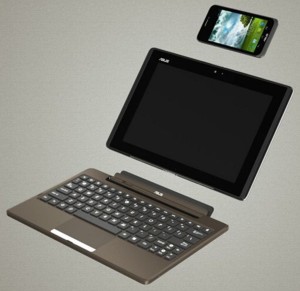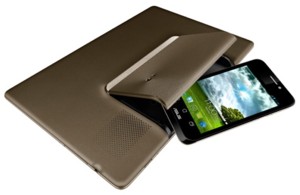Incoming from Rob Fisher:
The Padfone is supposedly going to be available in April and now has a keyboard attachment too. There’s a good chance I will buy one.
The point of the Padfone is that it is a mobile phone, a tablet, and a regular computer with a regular keyboard, all in one big clutch of stuff. It has just the one “brain” so to speak, and it is all in the phone. When you want the tablet or the computer to power up, you stick the phone inside the tablet, and the phone does everything from in there.
This is what it all now consists of:

And this is how the phone goes into the back of the screen:

I found those pictures here.
And here is video of the(se) thing(s), being demonstrated by someone who knows his way around it/them.
Also prompted by Rob Fisher, I did a posting here about this same gadget last July, when it was merely due Real Soon Now. I am especially proud of this bit of commenting on that from me (which follows on from a bit about how Apple kit (such as my Apple keyboard which I use with my otherwise totally PC PC – which still works absolutely fine) just works more nicely:
And I am starting to love Asus in a similar, and yet also completely opposite, way. They too are now setting new standards. Not in the sense that their stuff works, the way Apple stuff works. It doesn’t. But, it does work, as a specification. Their stuff says to everyone else: this is what you now have to make work, and this is what you have to charge for it. Look at all the people blogging about this, and even pre-ordering it, poor fools. This is the next Thing, people. Just do it.
Not every commenter agreed that this Padfone idea was a runner. Many thought the demand just would not be there for this new set of toys, and some who did think the idea a good one doubted whether the Asus version would be a success. We shall soon be finding out who was right.
Personally I love the idea, but have my doubts about Asus making it work well (based on bad experiences with the Asus Eee-PC). If I am wrong, and this spec doesn’t catch on, it will be Asus and their immitators who lose money, not me. If only the world’s financial system could work this well.
If this set of toys, or some set very like it, does catch on, my non-geek sense is that this will maybe represent a huge breakthrough for Google and their Android operating system, because Android was all along designed with this kind of integrated all-in-one system in mind? Yes? Maybe: no. What do I know? But, comments on that last point in particular would be much appreciated.




I don’t have any knowledge of the Android source, but my impression (from Google and their presentation of it from way back) is that Android was never “designed” with that sort of integration in mind.
It was designed to let Google have a phone OS so it could get search revenue from phones.
It will let you integrate like that, without too much work (well, the tablet and phone part – the touchpad thing is a huge issue for a touch-based OS).
I remain deeply unconvinced that either a touch OS used with a touchpad and pointer rather than as a touch OS will be any good (no matter who made it), or that with remotely current technology, that a CPU-in-your-phone is a good idea for a laptop that isn’t a glorified tablet. (And at that point, it should just remain a tablet, if it’s going to use a touch OS.)
In other words, the iPad + keyboard (keyboard case?) combination makes a lot more sense than this abortion.
(And that’s bracketing the huge issue of build quality and sturdiness, which has never exactly been Asus’ forte.)
Good on ASUS for trying, I suppose.
I REALLY hope it catches on.
Not because I want one. Because i want 3rd-party people to start making (cheaply) the screens and keyboards for any high-power Android, like mine, for example.
I don’t know if its designed in as standard from the beginning, but ICS does feature the ability to plug in most usb peripherals like mice, memory sticks etc so it’s a possibility. Android is a Linux distro too, don’t forget so the possibility has always existed to write your own code( and build your own hardware) if you so desired i suppose, but it’s probably only with the recent wave of multi-core phones that it’s something that would be suitable for mass market. Actually. I do recall seeing a video somewhere of someone with a bluetooth keyboard running their Nexus as a computer through their television, although i think they were running Ubuntu, not Android…
I’m not so sure it’s a winner – battery life and performance may be an issue with the pad/phone integration but it’s a cool idea.
Ultimately I’m glad to see someone trying something imaginative for once rather than the Samsungs of this world who are content to just copy whoever the market leader is doing at that moment in time.
I forgot to mention cost.
If it’s possible to buy the keyboard and screen for less than the price of a half decent netbook then people will buy it. They already got the phone with their contract, for free.
In a comment on the previous posting, I compared this new notion with the way that iPods can plug into other people’s hifi systems, which judging by the ubiquity of iPod docks in new hifi kit that I see on sale, they now can.
If that comparison is right, then I imagine a key question is: will a new standard interface between phones and screens emerge? If one set of vendors could concentrate on selling phones, even while these phones had the add-on option of becoming tablets or computers, that would make everything work better, I think.
I should guess that such an emergence could take quite a while. Or, it may never happen, because just too much has to be agreed on.
I’ll consider one when it comes out with a Debian Linux option. I do not trust security I cannot manage and test myself, nor code which has not been globally peer-reviewed by the open source community.
The only question in my mind about these new smart devices running closed source is: how *many* national security agencies and police organizations have built in compromises. Not if. How many.
Sigvald worries about integration: the Android API is designed to cope with different display sizes and ASUS claim to have done the work of making the transitions seamless. We shall see.
We do know that Android works pretty well with a mouse, keyboard, and full-sized screen as demonstrated here. This may be the video wh00ps remembers.
I doubt the phone plus all the accessories will cost less than a netbook, but I imagine it will cost less than a high end phone plus a netbook. And there’s the tablet configuration, too.
John Louis Swaine is concerned about battery life. Although the phone has a powerful CPU it is the latest Qualcomm system on chip that uses a new 28nm fabrication, meaning less power consumption for more processing. I imagine the phone’s battery life as a phone will be comparable to other smartphones.
The tablet part is not just a screen, it also has a large battery which boosts the phone when the two are connected. ASUS are not far off the iPad on their other high-end tablet so I expect this will be similar. And the keyboard? That has a battery too, which also boosts the phone when connected.
Dale: Android is mostly open. Cyanogenmod is even more open. I suppose the drivers probably aren’t open, especially the radio drivers. But is there any completely open smartphone?
With a name like ‘Asus’, it had better be good- or the nicknames alone will kill it! ‘Ass’, and ‘As-if’, and ‘Not-us!’ are the politer ideas!
I’ve already stated my reservations about tablets previously and given that, I don’t really see what this gains you over laptop+phone. You maybe save the price of a cpu (which is cheap) but you’re adding a bunch of hassle.
Still, I’m sure it will suit someone and that’s all that matters really.
Brian: Standard screen interface? HDMI do you? I’m not sure how flexible it is on resolution though and then you need to have the touch interface too I guess. That’s just USB though… Seems like it’s just the connector form-factor missing.
Actually I was probably a bit unfair to Dale. Every single bit in Debian is completely open and pure GPL.
Android itself is open but manufacturers tend to add their own closed software to devices. That’s why I suggested Cyanogenmod, which is just vanilla Android integrated to work on various devices and with a few tweaks, and it is also completely open. I already mentioned, though, that the drivers from the various manufacturers are closed, so who knows what they are doing? But also, typically, to get all the useful stuff like GMail and Android Market, users install the closed source “GApps” (Google apps) alongside Cyanogenmod.
Still, I find myself more than willing to take such (small?) risks when all these mobile devices are so fascinating and useful.
This reminds me a lot of the Atrix phone from motorola about 6-8 months ago.
Same sort of idea, though it was largely just a phone and a laptop. Everything was contained in the phone, and you plugged the phone onto a laptop-style dock.
Granted, the atrix wasn’t/isn’t as sleek as this Asus (I have the tablet version, that looks about the same, minus the phone, and it’s great so far.)
The atrix never really took off, and has already been largely forgotten.
I’ve been using the Motorola Atrix as my main “laptop” for about a year now. It takes some getting used to, and it’s not for everyone, but it’s worked out for me.
I am looking forward to getting a Padfone, You can read my thoughts on my blog here:
http://www.jlgatewood.com/2012/02/29/i-want-it-asus-padfone-and-my-comparison-to-the-motorola-atrix/
Assus Padfone is having good feature user can use only one plan with two devices, Cost wise also effective, it provides mobile connectivity to the tablet.Cost is 700 Pounds.Assus Padfone have 8 mega pixel camera.If u thinking on positive side having one dock and one phone is comparatively cheaper, other than buying two separate devices.For more details and video refer Asus Padfone(Link)
So lose your phone and your fucked? Good thinking Asus!